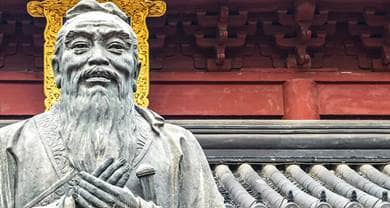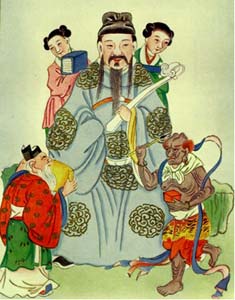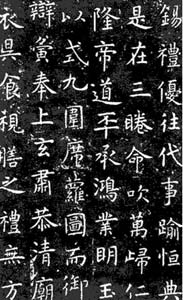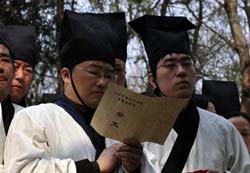- Trending:
- Pope Leo Xiv
- |
- Israel
- |
- Trump
- |
- Social Justice
- |
- Peace
- |
- Love

RELIGION LIBRARY
Confucianism
Historical Perspectives
Probably the most controversial scholarly arguments about Confucianism have involved the term "Confucianism" itself as well as the tradition's classification as a religion. Some Western scholars have argued that "Confucianism" was manufactured or invented by Asian and Western scholars as an alternative to Western individualism. Scholars also have examined the little-known impact of Confucian institutions, such as its civil service and imperial examination systems, on Western societies.
 Like other religious traditions, the history of Confucianism has become a battleground between traditionalists (who tend to see an unchanging essence revealed from the beginning of the tradition by sacred sources to founding figures) and modernists (who tend to see dynamic development over time that is related to changing human agendas and contexts). The traditional view of Kongzi as a founder of Confucianism largely has given way to the modern view of Kongzi as a figure similar to Socrates, Jesus, or Shakyamuni Buddha: an historical person whose image and ideas have been shaped mostly or entirely by those who lived after him.
Like other religious traditions, the history of Confucianism has become a battleground between traditionalists (who tend to see an unchanging essence revealed from the beginning of the tradition by sacred sources to founding figures) and modernists (who tend to see dynamic development over time that is related to changing human agendas and contexts). The traditional view of Kongzi as a founder of Confucianism largely has given way to the modern view of Kongzi as a figure similar to Socrates, Jesus, or Shakyamuni Buddha: an historical person whose image and ideas have been shaped mostly or entirely by those who lived after him.
The most radical scholarly critiques, such as E. Bruce Brooks' and A. Taeko Brooks The Original Analects: Sayings of Confucius and His Successors (Columbia 1998), claim that very little outside of book 4 of the Lunyu can safely be regarded as the authentic teaching of Kongzi, and identify other portions of the text with various disciples of Kongzi (such as Mengzi and Xunzi) and their competing agendas. Such "historical Confucius" studies so far have not changed the way in which most Confucians view their texts and traditions, even though most scholars now concede that early Confucianism was far more dynamic and varied than traditional accounts would have lead one to believe.
 For this reason, the use of monolithic terms (such as "Confucianism") to describe diverse families of traditions that may or may not have required exclusive membership on the part of their practitioners has become problematic for many scholars. For example, in The Five "Confucian" Classics (Yale 2001), Michael Nylan has pointed out how many Chinese thinkers regarded as "Confucian" also patronized rival traditions of similar antiquity and authority, even as some self-identified "Confucians" saw themselves as faithful to Kongzi's tradition alone. It was only when those in Kongzi's spiritual lineage became clients of the Han state that ancient texts such as the Wujing became identified as "Confucian." For this reason, Nylan argues that the term "Confucian" should be replaced with "classicist."
For this reason, the use of monolithic terms (such as "Confucianism") to describe diverse families of traditions that may or may not have required exclusive membership on the part of their practitioners has become problematic for many scholars. For example, in The Five "Confucian" Classics (Yale 2001), Michael Nylan has pointed out how many Chinese thinkers regarded as "Confucian" also patronized rival traditions of similar antiquity and authority, even as some self-identified "Confucians" saw themselves as faithful to Kongzi's tradition alone. It was only when those in Kongzi's spiritual lineage became clients of the Han state that ancient texts such as the Wujing became identified as "Confucian." For this reason, Nylan argues that the term "Confucian" should be replaced with "classicist."
The Han dynasty trend toward syncretism between Confucianism and its alleged rivals continued throughout the period between the Han and Tang dynasties (220 C.E.-618 C.E.). In The Classic of Changes: A New Translation of the I Ching [Yijing] as Interpreted by Wang Bi (Columbia 1994), Richard John Lynn shows that while Wang Bi (226-249 C.E.) uses Taoist terminology in his commentary on this ancient text, his concerns are deeply Confucian. Even thinkers long regarded as Taoists, such as Ge Hong (283-343 C.E.), turn out not have been associated with any Taoist communities, as Nathan Sivin argues in his seminal article, "On the Word 'Taoist' as a Source of Perplexity" (History of Religions 17 [1978]). Yet Ge Hong clearly espoused Confucian concerns, making the case for identifying him as a Confucian rather stronger than the case for seeing him as a Taoist in some scholars' eyes. A scholarly consensus that "Confucian" is not a very useful description for early thinkers within Kongzi's tradition has begun to emerge.
Many scholars now question the usefulness of the term "Confucianism" even when applied to the seemingly better-defined traditions of later imperial China. Benjamin A. Elman's Rethinking Confucianism: Past and Present in China, Japan, Korea, and Vietnam (UCLA 2002) documents how "Confucianism" does not correspond to any term used by so-called Confucians to describe themselves, their teachings, or their traditions. Some scholars even have argued that "Confucianism" was invented entirely by Westerners as a kind of inverse counterpart to individualistic values. Lionel Jensen's Manufacturing Confucianism: Chinese Traditions and Universal Civilization (Duke 1997) argues that 16th-century Jesuits devised the category of "Confucianism" in order to serve their own purposes as agents of a foreign religion seeking Chinese converts. Certainly, the role of Christian missionaries in shaping Western views of Confucian traditions -- from the early efforts of Matteo Ricci, S.J. (1552-1610 C.E.) to the pioneering translations of James Legge (1815-1897 C.E.) -- cannot be underestimated, and the fact that their portrait of early Confucianism resembles a kind of Platonic or Stoic monotheism, ripe for completion by the Christian gospel, should inspire suspicion.
Another thorny issue in the Western understanding of Confucianism has been the matter of its classification within categories originally developed to describe modern European traditions, namely "philosophy" and "religion." As Wilfred C. Smith put it in The Meaning and End of Religion (Fortress Press 1991), "The question 'Is Confucianism a religion?' is one that the West has never been able to answer and China never able to ask." This problem afflicts all scholarly approaches to Chinese traditions. Like any other category, "Confucianism" is value-laden, but the values with which it is invested depend on who deploys it. Those who have described these traditions as "religious" include the sociologist Max Weber (1864-1920 C.E.) (who saw Confucianism as China's obstacle on the path to modernization), Chinese Marxists (who felt the same way), and so-called "New Confucians" (20th-century Chinese intellectuals, mostly from outside mainland China) who conversely advocate Confucianism as the foundation of cultural and economic success stories from Singapore to South Korea.
Those who have rejected the categorization of Confucianism as "religious" include 16th-century Christian missionaries (who sought thereby to minimize conflicts between Chinese culture and Christian faith), 20th-century Chinese Communist bureaucrats (who did not wish to enfranchise Confucians politically, which official recognition of their tradition as a "religion" regulated by the government and represented at People's Political Consultative Congresses would have entailed), and many contemporary East Asians (for whom "religion" often connotes dogmatic narrow-mindedness, superstition, the West, or anti-modern sentiments). Confucianism's status as a "religion" remains a contested one, although most scholars of religion are willing to see it as such.
 Most scholars now agree that Confucianism is best understood as a loose network of traditions that share a common reverence for an idealized view of Chinese antiquity, a common commitment to social hierarchy (and its associated rituals, such as ancestor worship) as crucial for human development, and a common veneration of texts associated with Kongzi and his successors. Despite these commonalities, there are many profound conflicts across Confucian traditions, including disagreements about human nature, the role of book learning, and the proper relationship of Confucianism to other religious traditions. Of course, it has been said that a tradition is constituted by arguments about common concerns, and this certainly is true of Confucianism.
Most scholars now agree that Confucianism is best understood as a loose network of traditions that share a common reverence for an idealized view of Chinese antiquity, a common commitment to social hierarchy (and its associated rituals, such as ancestor worship) as crucial for human development, and a common veneration of texts associated with Kongzi and his successors. Despite these commonalities, there are many profound conflicts across Confucian traditions, including disagreements about human nature, the role of book learning, and the proper relationship of Confucianism to other religious traditions. Of course, it has been said that a tradition is constituted by arguments about common concerns, and this certainly is true of Confucianism.
Study Questions:
1. Why is "Confucianism" a controversial term?
2. Why do some see Confucianism as a religion?
3. Why do some claim that Confucianism is not a religion?










